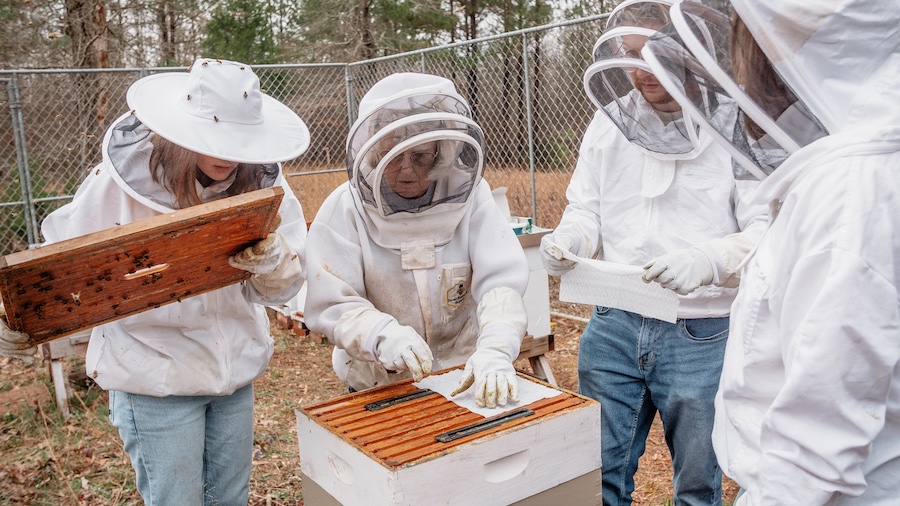In the whole scheme of things, bees appear to be pretty small and insignificant. But those little flying insects make a larger impact than many of us realize. Beekeeping activity at Anderson University’s Rocky River Nature Park is helping us gain insight on this important environmental function.
Tony Olekas, president of the Anderson County Beekeepers Association, points to estimates that bees are responsible for about 30 percent of our nation’s gross domestic product (GDP). Yields of the fruits and vegetables we eat would be nowhere near as high, nor the quality as good, were it not for bees. For example, it takes two bee hives (colonies) per acre to pollinate almond trees on 1.6 million acres in California. Almonds are but one of many crops that are dependent upon bees.
Cheryl Bequette, a member of the Anderson University staff, was in a Master Gardener class when her group began taking a beginning beekeeping class 10 years ago. A member of the Anderson County Beekeepers Association, she has been fascinated by beekeeping ever since.
After joining Anderson University’s staff as a campus safety officer, Bequette, now a certified beekeeper, sought out ways with the Anderson County Beekeepers Association to form a partnership to hold classes on campus and host an apiary (where beehives are kept) and teach beekeeping on campus.
“Last year it finally took. We had enough students of interest,” Bequette said. “The club (Anderson County Beekeeping Club) had money and was willing to donate the bees. A lady who was an alumna donated the hives.” Bequette added that the Anderson University Ecology Club got involved, and an apiary site was established at the Rocky River Nature Park, over a hundred acres of wetlands and forest located at Anderson University. A chain link enclosure was also donated to protect the hives.
Olekas is enthusiastic that his organization’s collaboration with AU has “blossomed” as Anderson University hosts regular meetings and classes on its campus.
“It improves the students’ involvement because they get hands-on experience and can attend meetings on campus. This year our expectation is to improve foraging for the bees at Rocky River Nature Park by planting a wildflower area in the park,” Olekas said.
Bequette commented that this spring they should know if the bee colonies have produced honey, in which case the Anderson University students will be able to learn honey extracting skills.
“There won’t be a ton of honey with two hives. One is doing better than the other, but you just never know. Trying to outguess insects is an interesting hobby,” Bequette said. She adds that part of the beekeeping skillset is understanding how the weather affects bees.
“Bees don’t like rainy weather, high winds or cold. We’re not going to open those hives if those conditions exist. Then you kill that incubation chamber and you decrease the health of the hive.”
Olekas pointed out tight temperature tolerances where the brood area is kept around 92-94 degrees fahrenheit.
“Beekeeping is an art and a science,” Olekas said, adding that at times even master beekeepers can lose bees due to factors that include bad weather, diseases and pests. “There is a lot going on in the colony.”
Beginner beekeeping courses are run periodically for those who are interested in the hobby. According to Olekas, it’s a comprehensive course where beekeeping experts cover the fundamentals, including colony life (bee biology), equipment, pests and diseases, as well as hive products—including honey.
And while beekeeping requires a large commitment of time, plus a lot of patience and some expense, class participants will be able to put on bee suits and see firsthand the colonies of bees at the Rocky River Nature Park while learning skills from experienced beekeepers.
More information can be found at the Anderson County Beekeepers Association website or their Facebook page “Anderson County Beekeepers of SC.

